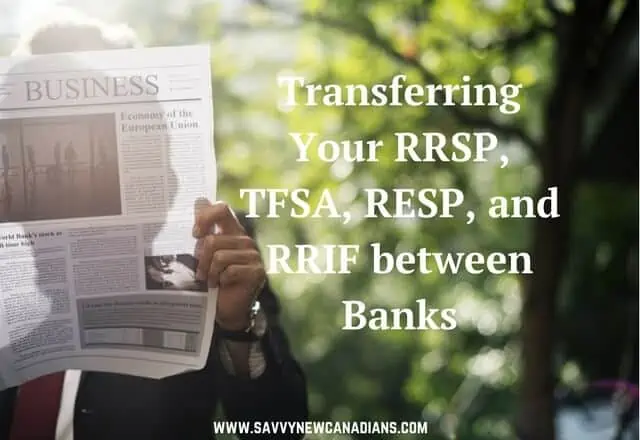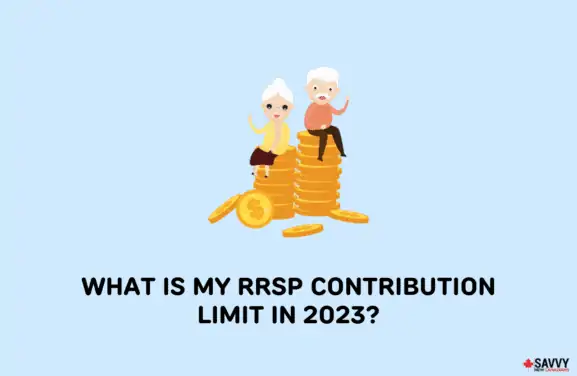Are you considering moving your RRSP, TFSA, RESP, or RRIF from one bank to another?
There are many reasons why you may want to transfer your registered investment accounts from one financial institution to the other. Some of these include:
- To consolidate all your accounts in one bank or financial institution for ease of access and management.
- When looking for cheaper investing options, such as lower MERs.
- Interest in proprietary investment assets available at a specific financial institution.
- Choosing to go with a self-directed account, i.e. Do-It-Yourself investing.
Transferring Registered Accounts Between Financial Institutions
In general, there are no tax consequences when you transfer your RRSP, TFSA, RESP, or RRIF directly between financial institutions. The transfer can be done in cash or in kind.
In kind transfer means that your investment assets are transferred directly to your new account in the receiving institution without any buying or selling taking place. For example, if you held 1,000 shares of TD in your old account, you will have the same amount in your new account.
In cash transfer means that assets in your old account are sold, and the resulting cash proceeds from the sale are transferred to your new account at the receiving institution, where it’s then used to purchase new investments as agreed to by you.
An in cash transfer is often recommended if your current investment holdings are proprietary and are not available or being offered at the receiving institution.
A potential downside to in cash transfers is if you are selling off your assets when prices are temporarily depressed – you could be hit with a significant loss!
Steps
- Ensure you have clarified your reason for transferring your registered account to another financial institution. Transfers can potentially be costly and should be done only when necessary.
- Print off a copy of your most recent investment statement. This will show what assets you own and their approximate value.
- Approach the institution where you are moving your account to and find out details on how long the process will take; whether you are able to do an “in-kind” or “in cash” transfer; whether they are willing to cover transfer-out fees charged by your current provider, and if there are any other applicable fees.
- Once the transfer form is submitted, it can take anywhere from a few days to several weeks to process it. Follow up with your new provider to confirm when your transfer has been completed.

RRSP, TFSA, and RESP Transfer Forms
Form T2033 is generally used for direct RRSP and RRIF transfers. Financial institutions usually have their own in-house designed form that can be used to transfer several registered accounts, including RRSPs, TFSAs, and RRIFs.
These forms capture the same information required by government transfer forms.
For RESPs, a three-part form (A, B, and C) is required. RESP Transfer Form A is completed by the subscriber (you), while the receiving and relinquishing financial institutions complete forms B and C, respectively.
Your new provider will provide you with an accurate form to fill out.
Information generally required on the forms includes:
- The transferring institution’s name and address
- The receiving institution’s name and address
- Account holder’s name and address (for RESPs, subscriber and beneficiary information is required)
- Social Insurance Number
- Account or policy number of the existing account
- Transfer type – in cash or in-kind
- Type of assets in holding – GICs, mutual funds, etc.
- Authorization for the transfer – signature and date
Transfer Fees For RRSP, TFSA, RESP and RRIF
Transfer fees charged by the financial institution transferring your account vary – up to $150 plus tax in 2023. The maximum Transfer-out fees (for the full account) for RBC, TD, BMO, CIBC, and Tangerine are as follows:
| Accounts | RBC | CIBC | BMO | TD | Tangerine |
| RRSP | $135 | $135 | $150 | $150 | $50 |
| TFSA | $135 | $135 | $150 | $150 | $50 |
| RESP | $135 | $135 | $150 | $150 | – |
| RRIF | $135 | $135 | $150 | $150 | $50 |
Depending on the size of your account, you can negotiate with the receiving financial institution to cover some or all of the transfer fees.
For example, RBC Direct Investing will cover fees of up to $135 for registered account transfers to RBC of $15,000 or more. Wealthsimple covers transfer-in fees on assets of $5,000 or more.
Transfer fees may vary across bank subsidiaries and products. For example, the fee you pay to transfer a CIBC RRSP GIC ($100) differs from what you pay when transferring your RRSP investment account from CIBC Investor’s Edge ($135).
Partial account transfers also incur lower fees.
Learn more about RRSP and TFSA transfer fees.
Closing Thoughts
Transferring your registered investment accounts from one bank or discount brokerage to another is not as difficult as it appears.
The receiving institution (your new bank) will complete most of the paperwork on your behalf and contact the relinquishing institution (your old bank) directly.
Transfer fees can be a bummer. It doesn’t hurt to negotiate with the receiving institution and ask if they will cover some or all of the costs.
Questwealth

Professionally managed ETF portfolios
Multiple accounts & low fees
Auto rebalancing and div reinvesting
Invest $10K free in 1st year
Also Read:






I tried to transfer my RRIF account at Scotia Bank to another provider that has another RRIF in my name. The Scotia account is holding another 17 GIC’s that have varying maturities with the last one maturing in 2021. They refuse to let me transfer this account “in kind”. As a result I need to transfer one at a time and pay a transfer fee each time. Are they in their right to withhold the transfer in kind?
Hi Eugene.
Sorry to hear about the difficulties you are facing with moving your RRIF GIC’s to another financial institution. The problem with transferring GIC’s and term deposits between banks is that you may need to wait until the GICs mature and then move them “in cash.” There may be some exceptions, and you should ask Scotia to clarify what other options (if any) are available to you.
Without knowing what it is and before doing enough research, I opened an RESP A/c with Industrial Alliance FG in 2011. I’m not getting good returns, and on top of that the MER is quite high. I want to transfer my RESP A/c to another financial institution, but Industrial Alliance is telling me that I would have to pay a fee of $1800 to move my investments from them to another institution. Also, the worst part is they are telling me that I can’t stop/reduce my deposits, since it’s a commitment I’ve made. So, now i’m stuck with this useless Institution that doesn’t pay me good returns for my investments and on top of that charges me heavy MER(3.61%). so, I need some valuable advice , how to deal with this situation. Any advice/suggestion on this would be very much appreciated. Thanks!
@Toronto Arcot: Wow!! 3.64% MER?You are definitely losing money! I am not sure how these non-traditional bank-type RESP’s work. I am assuming it’s a group RESP and the small print ties you in with heavy penalties. You should look at what their terms for getting out are and depending on when you are in the timeline (i.e. how long before your kid needs the money), it may/may not be worth getting out of. Unfortunately, I am unable to give you a straightforward answer because I don’t know what’s in your contract.
RESP from insurance companies are not a good idea. They put heavy fees as a deter clients from cancelling their policies. It’s really a money grab for insurance agents. They provide guarantees at maturity but you’re better off putting that money in a RESP with the bank. They have funds that are based on clients time horizon. Beware of RESP offered through insurance companies, time horizon is too short to justify purchasing a RESP insurance protected investment.You’re better off purchasing life insurance separately then pay for the fees and protection offered as a feature in an RESP.
I have a mutual fund rsp with TD, i want to move it to scotia bank as i am looking to have just one bank. how feasible is that?
It is possible. However, depending on what you have right now, you may have to sell your current mutual funds and buy again at Scotia bank. Better to chat with them at Scotia and see what they say. They should be able to facilitate the process.
I have an existing RRSP with SunLife through Group plan at work. My Employer matches my contribution up to 3% of my Annual income. I want to keep contributing to this Sun Life RRSP each year to get the 3% match benefit. However, I want to move the existing RRSP balance (from previous years contributions) to another Financial institution RRSP account.
In the past i have only done transfers of the entire Account to the new Financial institution and closed the old account. In this case, I want to do the transfer of the existing funds to the new Financial Institution, but keep the old Group Account RRSP open so i can keep contributing to it each year.
Can I transfer a set $amount of Funds from this Sunlife Group RRSP to a new personal RRSP account, but keep the Sunlife RRSP account open for future contributions. In a way I would syphon $ from Sunlife group plan and transfer to my new personal RRSP plan at a different financial institution.
@Barry Fox: Without knowing the specifics of the Sunlife plan, this is potentially possible. One thing though is that if this is a Group pension plan, there may be restrictions on the type of account you can transfer it to. For example, funds from some pension plans can only go into a locked RRSP (LRSP) and cannot be withdrawn until a certain age. Best to ask Sunlife plan administrator about what is possible.
Cheers.
Great topic! I became an estate trustee for two young children where an RESP was set up for them several years ago. The RESP was set up in the name of the previous estate trustee whom I replaced. I’m working with Sunlife to transfer in kind, however, they indicated that the investment may need to be redeemed and set up a new account. I’m concerned about tax implications. Can I I ensure the funds can be transferred without any tax exposure? Thanks.
@Jenny: Without knowing the full details of their RESP portfolio, it is certainly possible. A potential issue is when you are transferring funds to a different bank. Sometimes, the new financial institution does not carry similar assets and a transfer-in-kind is not possible. Best to discuss your taxation concerns with Sunlife before making any changes. If their account is staying in-house, it should be possible, I think.
I am being forced out of my investment institute with my RRIF because it is too low. I had hoped to have run out but the minimum now is $50,000.00 my investment is $5,500.00. I am told that there is no fee to transfer to Investors Edge with CIBC. Can I transfer it to my bank in kind, mutual are 100% low risk as I am old senior. I don’t want to belong to Investors Edge at CIBC
@Elizabeth: Depending on the kinds of assets in your RRIF portfolio, you may be able to transfer them in kind. However, if the assets are proprietary to your current financial institution, it will have to be moved in cash.
Question, I have approx $2000 sitting in an RRSP with CIBC and I haven’t been able to bank with CIBC for quite some time as my ex partner processed fraud on my account and long story short, the amount he stole from me later when into an overdraft and because I was unable to pay it back they closed the account and collection agency’s are involved…however I still have $2000 sitting in my RRSP not doing anything. Am I able to transfer the $2000 from my old RRSP account with CIBC over to an RSP account with tangerine..?? Or is an RSP totally different than an RRSP?? I
@Tessa: Yes, you should be able to transfer your RRSP account from CIBC to Tangerine. You can start by chatting with Tangerine on what the steps are from their end. An RSP generally refers to an RRSP.
Do you know if it is a requirement that financial institutes have the original, pen signed, Direct Transfer form before proceeding with the process?
I’m trying to move RRSP from one bank to another and completed and signed the Direct Transfer form electronically (i.e., image of my signature pasted over the signature spot) as I don’t have a printer. The receiving bank told me I could not send it to them electronically but that I had to get a paper copy of the blank form, fill it out and sign it, then mail it to them. They specified that I could not just print the form I created electronically and mail it too them.
Thanks
@CR: I can see why they would want to receive your originally signed document. Transferring an account from one bank to another is somewhat of a big deal and things can go horribly wrong if it’s not done appropriately. The bank basically wants to be covered just in case, especially if they are an online-only bank.
When I transfer out the entire amount of an investment account from one bank to another- TFSA, RRSP or RESP- does it automatically close the old accounts with the former bank?
@Mastorich: Yes. However, it may depend on the bank. Your best bet is to give them a call and let them know you would like to close your account as well. Sometimes, accounts are automatically closed when they have been dormant for 2 years. In some cases, they leave them open even after you have defunded the account. Call to make your wishes known. Some banks will ask you to visit a branch to complete the closure.
Dear Mr. Omololu,
Thank you for your column. I was never told by either investors; Manulife and TD Trust what the consequences of transferring my investments to my bank would involve. Due to the uncertainties in today’s market, can I simply transfer my RSSP and mutual funds held at both institutions to my TD saving’s account “in kind” without a sell out loss?
Thank you. Bonnie
@Boniie: I’m not sure I understand your question. If for example, your investments (RRSP/TFSA) are in mutual funds, you will need to sell them to put the cash in your savings account. Based on current market conditions, you will likely be realizing a loss.
Sign up for weekly newsletter please
Good morning Mr Omulo,
I have a TFSA locked-in account. The did not tell me the definition of locked-in. I thought I can withdraw my money within five years but not received any money. I bought a house knowing I can sue my money for down payment. Unfortunatly, they told me that I can not withdraw my money. I am facing to loss my $10,000.00 deposit of the house if I can put down my down payment. In addition I owe revenue from my reassessment. I told my bank my reason to withdraw the money but they still no to me. Kindly advise what is the best avenue to withdraw or close my account. Can I transfer my account to another institution and withdraw half? Cora
@Corazon: Is your money held in a non-redeemable GIC? If so, you may be able to withdraw the money before the term ends by paying a penalty fee.
Hi Enoch.. thanks for the great info. Just wondering if you know what rules Investors Group has on transferring out investments like RRSP, TFSA etc? I read in some forums that some got nailed with Deferred Sales Charge since the investment was purchased less than 7 years..
@RM: No, I am not very familiar with their offerings. That said, I seem to remember another reader leaving a comment a while back that suggested something similar.
I have a problem with my bank after I transferred my LIF from a different bank to this one.
Concerning maximum withdrawal amount.
Because it was transferred in, they are saying my maximum withdrawal is calculated from the Dec 31 balance, and not the gains (which is higher) achieved during the year.
Alberta jurisdiction..
Please email me for further discussion..
Hello, I just recently transferred accounts from RBS. The rate shown in you table is not accurate. It is 25$ for RESP and 50$ for RRSP transfer to another institution. It is posted on their website.
@Geula: Transfer outs at RBC Direct Investing are $135 for all account types, excluding donation of shares.
Please sign me up for your news letter mailing list.
@YJ: You can sign up using the “Sign Up” button in the menu or you can use the opt-in form at the bottom of the article. Cheers.
Great article! Is the RESP transfer out fee from TD is free, or is this information not available?
@EE: I checked and registered account transfer-outs on TD Direct Investing cost $150.
Hi, I am trying to move a cash RIF from Tangerine to Simplii.Tangerine has the documents since Nov 15th and still haven’t transferred the funds. I have lost 6 weeks of a lot higher interest rate. Is there anything I can do to speed up the process?
Thanks
Ron
@Ronald: Sorry to hear about the delays you are experiencing with your transfer. Other than trying to contact Tangerine’s customer service, I am not sure what else you can do.
I am trying to transfer my kids Scotiabank RESP to T D Canada Trust but Scotiabank is not allowing the transfer to be completed…this has been going on for six months and each month they have a different request to be made…
1. ) antiquated forms being used but the form is being used the same as the government website forms.
2.) Scotiabank is insisting that the plan be registered with T D Canada Trust but it does not say that on again, the government website.
3.) Scotiabank is now encouraging me to move this transfer request to another yet another financial institution.
Hi, I’ve requested a transfer from my RSP TD account to my OMERS plan to buy back service. Proper forms were sent, and TD rejected the transfer because there was insufficient amount for transfer fee and taxes. I’ve now added the amount to cover the transfer fee.
Now OMERS is refusing to make a follow up request to pull the money and my TD branch says they don’t directly handle transfers, it’s a department that clients can’t access. How can I make this transfer happen and why won’t any of these institutions help?